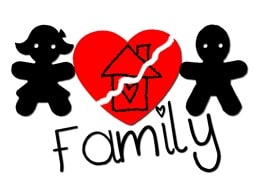
You can find an updated copy of this article on Hope 4 Hurting Kids using this link.

You can find an updated copy of this article on Hope 4 Hurting Kids using this link.

There are two general types of custody: legal custody (which refers to who gets to make major decisions for the kids including decisions related to education, healthcare, religion, etc.) and physical custody (which refers to where the children will spend their time).
LEGAL CUSTODY
There are two types of legal custody.
Joint Legal Custody

You are not alone though. Statistics tells us the about 75% (that’s 3 out of every 4) divorces end a marriage that is classified as “low conflict.” That means that the parents didn’t argue or fight very much. So, there are lots of kids out there who had no idea that their parents were headed down the road to divorce until it actually happened.
If you were shocked by the news of your parents’ divorce, there are a few things you need to keep in mind:
Continue reading

The same things happens for time spent with you. Before the divorce, you probably spent time with both parents, but after the divorce there will be some sort of visitation schedule that determines who you will spend time with and how much time you will spend with each parent.
One of the other things that gets split up in a divorce is the family’s income (how much money your parents’ earn). The judge, or your parents if they can agree on an amount, will determine who gets what portion of the family’s income. The goal is to make sure both parents, and houses, have enough money to live on, but this doesn’t always happen because now the same income has to support two homes instead of just one.
Sometimes one parent earns more than the other parent – maybe your dad worked prior to the marriage and your mom stayed at home or vice versa. In that case, one parent will earn more money. In order to make things more fair, the judge may decide that one party has to pay support to the other. There are two types of support a judge might order – alimony and child support.
Alimony is money that one party has to pay to the other after the divorce in order to make their income more fair. So, if the goal is to make sure that both parties get one-half of the income, and dad is the only one who works outside the home, he would be ordered to pay an amount equal to one-half of what he earns to your mother.

Sometimes, children of divorce wonder if they even still belong to a family. When you travel back and forth between two homes, it sometimes feels like you don’t fully belong in either place. Are the people in one of those homes your family while the others are not? Maybe it’s just you and your siblings and one parent. Is that still a family? Maybe you live with your grandparents or aunt and uncle since the divorce. Are they part of your family? Are your parents still part of your family? Maybe your mom is remarried. Are your stepdad and stepsiblings part of your family? Maybe your Dad divorced your stepmom. Is she still part of your family? It can all get really confusing following a divorce.
It all comes down to one questions – What is a family? The fact is that, while living arrangements might change following a divorce, who makes up your family does not. Your family still consists of your mother and father and siblings and grandparents and aunts and uncles and anybody else who was part of your family before the divorce – whether you still live in the same house or not. The one change that you may experience, in time, is the addition of new family members. If your parents get remarried or have additional children following a divorce, you will have new people in your family. Sometimes that is hard to get used to, and sometimes it takes a while before those people feel like family. That’s ok.

The word “divorce” is a legal term (something used by lawyers and judges) for when one or both people who are married choose to no longer be married to one another and end up no longer living together. They sign some legal papers that say that they are single again and free to marry someone else if they choose to do that. Although your day-to-day living arrangements might change, divorce does not in any way change either of your parents’ relationships with you. Even though your parents are no longer wife and husband, they are still your mom and dad.
Because divorce is a legal proceeding, the people involved (your mom and dad) usually have lawyers or attorneys to explain the laws to them and speak for them in court. If your parents are getting divorced, you may have to speak to the lawyer for one or both of your parents. In some cases (especially where parents are having a really hard time getting along), a special lawyer or person is appointed for the child to represent their interests during the divorce. This person is appointed by the court and are often called a Guardian Ad Litem. In some places, they are called Court Appointed Special Advocates.
The purpose of the divorce proceeding (including all the meetings and court appearances) is to determine how to split up the assets (all the stuff your parents own) and the custody of any children (how much time you will spend with each parent and when).
Some divorces end up in a court room before a judge who will make decisions about how your parents’ divorce will work including issues related to where you will stay. If your parents can work out the details of their separation together with their attorneys before going to court, that is called a settlement.

Did I cause my parents’ divorce?
That answer is:
